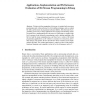Free Online Productivity Tools
i2Speak
i2Symbol
i2OCR
iTex2Img
iWeb2Print
iWeb2Shot
i2Type
iPdf2Split
iPdf2Merge
i2Bopomofo
i2Arabic
i2Style
i2Image
i2PDF
iLatex2Rtf
Sci2ools
108
click to vote
PADL
2007
Springer
2007
Springer
Applications, Implementation and Performance Evaluation of Bit Stream Programming in Erlang
Writing code that manipulates bit streams is a painful and error-prone programming task, often performed via bit twiddling techniques such as explicit bit shifts and bit masks in programmer-allocated buffers. Still, this kind of programming is necessary in many application areas ranging from decoding streaming media files to implementing network protocols. In this paper we employ highlevel constructs from declarative programming, such as pattern matching at the bit level and bit stream comprehensions, and show how a variety of bit stream programming applications can be written in a succinct, less error-prone, and totally memory-safe manner. We also describe how these constructs can be implemented efficiently. The resulting performance is superior to that of other (purely) functional languages and competitive to that of low-level languages such as C.
Related Content
| Added | 08 Jun 2010 |
| Updated | 08 Jun 2010 |
| Type | Conference |
| Year | 2007 |
| Where | PADL |
| Authors | Per Gustafsson, Konstantinos F. Sagonas |
Comments (0)

